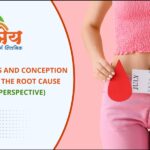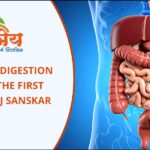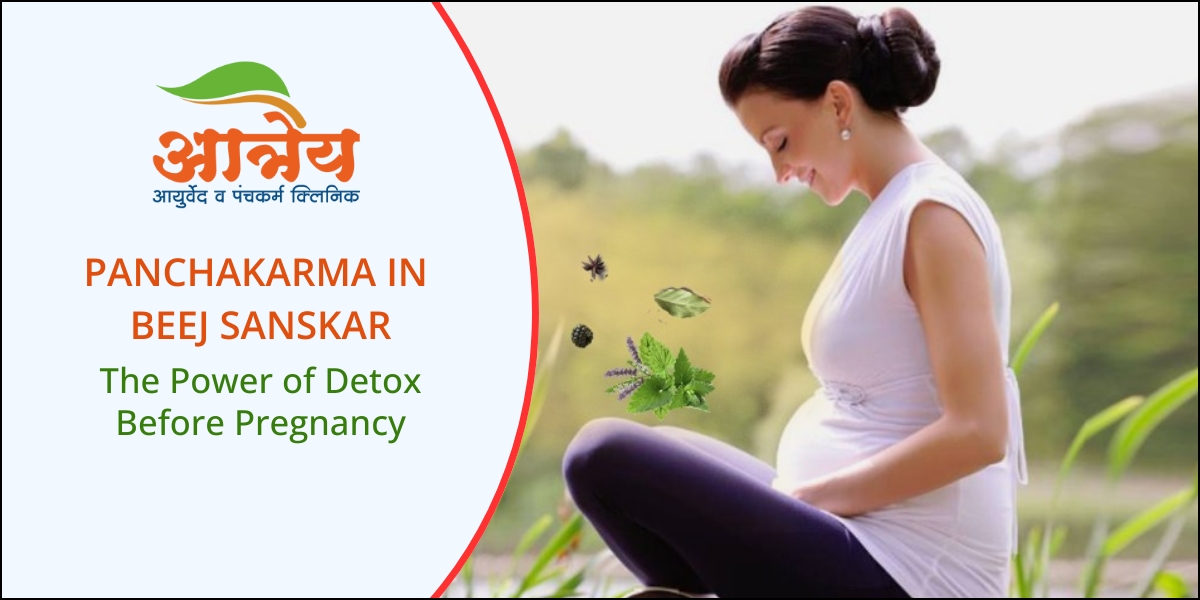Before planting a seed, the soil must be cleansed and nourished — the same principle applies to human conception. Ayurveda calls this purification process Panchakarma, a series of natural detoxification therapies designed to balance Doshas, remove accumulated toxins (Ama), and rejuvenate the reproductive system.
In the Beej Sanskar program, Panchakarma plays a vital role. It prepares both partners’ bodies to conceive a healthy, intelligent, and emotionally balanced child by ensuring that their Beeja (sperm & ovum) are pure, strong, and free from imbalance.
Why Detox Is Essential Before Conception
Today’s environment exposes us to stress, pollution, processed food, and hormonal disruptors. These factors create toxins that weaken digestion, disturb hormones, and affect fertility.
Ayurveda explains that unless these toxins are cleared, the Shukra Dhatu (male reproductive tissue) and Artava Dhatu (female reproductive tissue) cannot function optimally.
Panchakarma ensures:
- Balanced Doshas (Vata, Pitta, Kapha)
- Improved hormone regulation
- Clean reproductive channels
- Enhanced gamete quality
- Better implantation and fetal nourishment
Stages of Panchakarma in Beej Sanskar
1. Purva Karma – Preparation Phase
This includes internal and external Snehana (oleation) and Swedana (steam therapy) to loosen toxins from deep tissues and prepare the body for elimination.
2. Pradhan Karma – Main Detox Therapies
Based on Dosha predominance and body constitution, selected therapies are performed for each partner:
For Both Partners:
- Virechan (Pitta cleansing): Removes toxins from the liver and intestines; balances hormones.
- Basti (Vata balancing): Nourishes reproductive channels, improves sperm & ovum quality, supports mental calmness.
For Women:
- Uttar Basti: A gentle uterine detox performed under expert supervision. It purifies the uterus, regulates cycles, and enhances implantation potential.
(Note: Each Panchakarma plan is customized and should always be done under Ayurvedic medical guidance.)
3. Paschat Karma – Rejuvenation Phase
After detox, Rasayana therapies nourish and rebuild the body. This phase improves strength, fertility, and emotional well-being — ensuring the purified body can generate pure Beeja (sperm & ovum).
Benefits of Panchakarma in Beej Sanskar
- Removes deep-seated toxins (Ama)
- Balances hormones naturally
- Improves sperm & egg quality
- Enhances uterine and endometrial health
- Calms the nervous system and relieves stress
- Improves success rate of natural conception and assisted fertility methods (IVF/IUI)
Ideal Timing for Panchakarma in Beej Sanskar
Both partners should begin Panchakarma 3–6 months before planning conception.
This allows adequate time for detoxification, rejuvenation, and preparation of the reproductive tissues (Shukra Dhatu & Artava Dhatu).
Supporting Diet During Panchakarma
- Include: Khichadi, moong soup, boiled rice, ghee, buttermilk, and herbal teas.
- Avoid: Cold drinks, fried snacks, processed sugar, caffeine, and leftovers.
- Drink warm water throughout the day and eat light, easily digestible food.
Panchakarma is not just a detox; it’s a sacred preparation for life. In the Beej Sanskar journey, it clears toxins, harmonizes hormones, and rejuvenates the body — ensuring that conception occurs in the purest possible state. For couples who wish to bring healthy, balanced, and emotionally strong children into the world, Panchakarma before pregnancy is a powerful first step.
For a customized Beej Sanskar Panchakarma program, contact Aatreya Ayurved Clinic at 9860007992.
FAQs on Panchakarma & Beej Sanskar
Q1. Is Panchakarma safe for couples planning pregnancy?
Yes, when done before conception under professional supervision, it’s completely safe and beneficial for fertility.
Q2. Can Panchakarma improve IVF or IUI success rates?
Yes. Detoxification enhances egg & sperm quality and prepares the uterus, improving implantation rates.
Q3. Do both partners need Panchakarma?
Absolutely. Detoxifying both ensures the purity of sperm & ovum and balances the couple’s physical & mental health.
Q4. How long does the Beej Sanskar Panchakarma process take?
Usually 21–45 days, depending on the couple’s health and Dosha balance.
Q5. Can Panchakarma be done during menstruation or pregnancy?
No. It should only be done before conception, not during menstruation or pregnancy.







